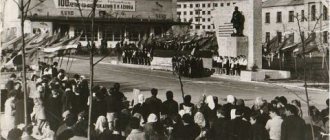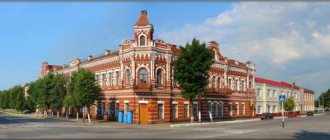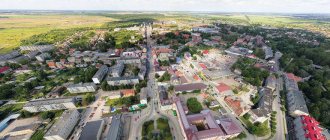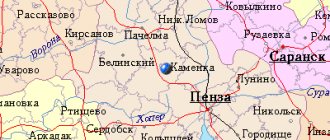| City Karachev Coat of Arms |
| A country | Russia, Russia |
| Subject of the federation | Bryansk regionBryansk region |
| Municipal district | Karachevsky district |
| urban settlement | Karachevskoye |
| Coordinates | 53°07′00″ n. w. 34°59′00″ E. d. / 53.11667° n. w. 34.98333° E. d. / 53.11667; 34.98333 (G) [www.openstreetmap.org/?mlat=53.11667&mlon=34.98333&zoom=12 (O)] (Z)Coordinates: 53°07′00″ N. w. 34°59′00″ E. d. / 53.11667° n. w. 34.98333° E. d. / 53.11667; 34.98333 (G) [www.openstreetmap.org/?mlat=53.11667&mlon=34.98333&zoom=12 (O)] (I) |
| First mention | 1146 |
| Former names | Korachev |
| Square | 15 km² |
| Center height | 200 |
| Population | ↘18,175[1] people (2016) |
| National composition | Russians and others |
| Confessional composition | Orthodox and others |
| Names of residents | Karachevitsy, Karachevets |
| Timezone | UTC+3 |
| Telephone code | +7 48335 |
| Postcode | 242500 |
| Vehicle code | 32 |
| OKATO code | [classif.spb.ru/classificators/view/okt.php?st=A&kr=1&kod=15224501 15 224 501] |
| Official site | [karadmin.ru/n.ru] |
Audio, photo and video
on Wikimedia Commons
Karachev
- a city in Russia, the administrative center of the Karachevsky district of the Bryansk region. Located on the Snezheti River, a tributary of the Desna, 44 km from Bryansk. Population - 18,175[1] people. (2016) - the seventh largest city in the region.
Story
Karachev is one of the oldest Russian cities, first mentioned in the Ipatiev Chronicle in 1146[2]. According to one version, the name of the city (originally Korachev) comes from the Slavic “crust” or “korch”. There is also a widespread version that “Karachev” translated from Turkic means “black forest”, but the name of the city was established long before the Tatar invasion. Since 1246, after the collapse of the Chernigov principality, Karachev became the center of the appanage Karachev principality, from the 2nd half of the 14th century. was under the rule of the Grand Duchy of Lithuania. In 1500 it became part of the Grand Duchy of Moscow; was a guard city on the Crimean side. In 1708 it was assigned to the Kyiv province, in 1719 it became part of the Sevsk province (from 1727 - as part of the Belgorod province), from 1778 - a district town of the Oryol province. In 1920 it became part of the Bryansk province. Since 1929 - a regional center (initially as part of the Western Region, since 1937 - in the Oryol Region, since 1944 in the Bryansk Region).
On October 6, 1941, Guderian's 47th Motorized Corps of the 2nd Panzer Group occupied the city. The 43rd Army Corps, bypassing Bryansk from the north and advancing to Karachev, sought to connect with units of the German 47th Motorized Corps and complete the encirclement of the troops of the Bryansk Front.[3]
On August 12, 1943, the 11th Guards Army (I. Kh. Bagramyan), after a short artillery preparation, began an assault on the Karachev defensive positions. The enemy continuously counterattacked, bringing in more and more reserves. On the night of August 13, the Germans reinforced their Karachev group with the 78th assault infantry division, fifty tanks and two armored trains. The 11th Guards Army, having failed to capture the command heights on August 12 and 13, began to bypass Karachev from the north and south. The enemy, in order to avoid encirclement, began to retreat from Karachev. On August 15, the 11th Guards Army (I. Kh. Bagramyan) and the 11th Army (I. I. Fedyuninsky) liberated the city. By order of the Supreme Commander-in-Chief of August 15, 1943, the 16th and 84th Guards Divisions were given the honorary name Karachevsky.[4]
Karachevskaya fire tower
It should be noted that at a time when Karachev was still predominantly made of wood, the city actually burned to the ground several times, as the legends say. In the 1860s, water barrels were installed in every block to put out fires.
The fires were extinguished not by professional firefighters, but by volunteers specially selected for this purpose. The criterion was quite strange in modern times - it was necessary that the candidate could sleep uninterruptedly for 24 hours. Ordinary townspeople also took part in extinguishing the fires. Refusal was punished, and quite severely, without regard to status.
In 1862, the Karachevskaya fire tower was installed. For this, permission from the emperor was obtained. More than three thousand silver rubles were allocated for construction, which was a very substantial amount. At the tower there was a team of 20 peasants. But even with such measures, firefighters still did not have time to cope with all the fires.
Although there was still a certain effect. From the tower the entire city was clearly visible, and as a result it was possible to act more quickly.
Attractions
- Cathedral of the Archangel Michael
. Located on the right bank of the river. Snezheti, in the middle of a small square in the southern part of the city, on the territory of an ancient settlement of the 12-17th centuries. Rising above the surrounding buildings. In the beginning. 17th century here stood the wooden Cathedral of the Archangel Michael, in the 1st third of the 18th century. replaced by a stone one (known from documents from 1745).
- Church of All Saints on Novaya Sloboda
. Located on the south-eastern outskirts of the city, on the former. Orlovskaya st. It stands on a high point facing the river. Snowy slope. Built in 1865-74. by order of the priest F. Korenev and the elder A. Khudyakov, instead of the wooden church of 1776 that burned down in 1863. The brick and whitewashed building was made in stylized Baroque forms. In 1890, a stone fence was built (now dismantled).
- Karachevskaya fire tower
. - St. Nicholas Church.
Located opposite the city hospital and clinic. Three limits. Active.
- In the suburban village of Berezhok there is the Resurrection Church
of the 17th-18th centuries. Tikhonova Hermitage, abolished in 1764 (the monastery was restored in 2004).
- 7 km northeast of Karachev is the village of Odrino, where individual buildings of the ancient Odrino-Nikolaevsky monastery
- the refectory and the abbot's building. Currently there is a convent here, and new buildings are being built. - Temple in honor of the Dormition of the Blessed Virgin Mary.
Located on Uritsky (Uspenskaya) street. Revived. After construction, it was consecrated by Archimandrite Moses, the governor of the Beloberezhskaya Hermitage (later Moses of Optina).
Natural monuments
There are several interesting natural objects on the territory of the Karachevsky district. In particular, this is the Karachevsky nature reserve, created in 2006. It covers an area of more than 27.6 thousand hectares. Its main goal is to preserve the bison population, as well as other rare species:
- lynx;
- badger;
- black stork;
- eagle owl and others.
Ecotourism and recreational fishing are allowed on the territory of the reserve. The place is located north of the city itself, on the lands of the Karachevsky forestry.
Another natural monument, albeit of regional importance, is Resseta. These are, in fact, artificial plantings around the memorial complex created in the early 1990s in memory of the victims of fascism. Territory - 790 hectares. Located in the same direction - Bryansk region, Karachevsky district, north of the city.
Fans of ecotourism are also attracted by the natural monument called “Dune Hills”. It is located north of the village of Ryasniki, on the left bank of the Snezheti River. This is a relatively small area of the valley with beautiful sand dunes. Many rare plants grow here.
You can also admire rare plants on the territory of the Ryabchik natural monument. It is famous for the fact that checkerboard hazel grouse grows here. In addition, there are:
- juniper;
- Lyubka bifolia;
- Goodyera repens.
The territory of the monument is a small area of forest with swampy clearings. It is located 1 km from the station. Mylinka.
Notable natives
- Aaron (Moryakin) (1780-1844) - archimandrite, governor of the Alexander Nevsky Lavra.
- Bulgakova (Pokrovskaya) Varvara Mikhailovna (September 5/17, 1869 - February 1, 1922) - mother of the famous Russian writer Mikhail Afanasyevich Bulgakov.
- Zayats, Mikhail Vladimirovich (born 1981) - mixed style fighter.
- Kolyakin, Vladimir Ivanovich (1965-2001) - First holder of the Order of Courage in the Bryansk region.[18]
- Lev Optina (in the world Lev Danilovich Nagolkin - in 1768) - glorified as a saint by the Russian Orthodox Church, one of the great elders of Optina Pustyn.
- Lokshin, David Borisovich (1921-1995) - Soviet and Russian musician and artist.
- Mulyar, Dmitry Sergeevich - theater and film actor.[19]
- Nozdrachev, Alexander Danilovich (born 1931) - Soviet, Russian scientist, specialist in the field of physiology of the autonomic nervous system and physiology of visceral processes. Academician of the Russian Academy of Sciences (1997), professor.
- Ovchinnikov, Adolf Nikolaevich (born 1931) - leading artist-restorer of the All-Russian Art Scientific and Restoration Center named after Academician I. E. Grabar
- Chebotarev, Vladimir Aleksandrovich - director, screenwriter ("Amphibian Man", 1961)[20]
- Shagin, Anton Aleksandrovich - Russian theater and film actor
- Elder Dosifei, who first lived in the Ploshchanskaya Hermitage, became a monk here. Lived for 40 years in the forests of Roslavl. He spent a year in prison, in October 1827 he arrived at the monastery of Optina Pustyn, and died at the age of 75.[21]
- Schimonakh Fedor (Perekhutov) - born in 1756 died on April 7, 1822 in the Alexandrosvir Monastery. He was a student of Paisius Velichkovsky at the Nyametsky Monastery. He was the spiritual father of Lev Optinsky. His biography was compiled by novice Fr. Lev (Nagolkina) Dmitry Alexandrovich Bryanchaninov, in the future Saint Ignatius Bryanchaninov.[21]
- Father Ioannikiy (in schema Leonid) in the world Joakinf Tikhonovich Bocharov. Nephew Fr. Fedora. He was a resident of the Beloberezhskaya Hermitage until 1814 and cell attendant to Fr. Lev (Nagolkin), then moved to the Valaam Monastery, then to the Alexander Nevsky Lavra. He died on December 4, 1853 at the age of 70 in Optina Pustyn.[21]
Notes
- ↑ 123
www.gks.ru/free_doc/doc_2016/bul_dr/mun_obr2016.rar Population of the Russian Federation by municipalities as of January 1, 2016 - Karachev // Encyclopedic Dictionary of Brockhaus and Efron: in 86 volumes (82 volumes and 4 additional). - St. Petersburg, 1890-1907.
- [nasledie.dubna.ru/item.asp?idcategory=26&id=26&iditem=683 Moscow Regional Public Foundation for Historical and Local Lore Research and Humanitarian Initiatives “Heritage”]
- [www.soldat.ru/doc/sovinfburo/1943/1943_08.html According to official reports of the Sovinformburo.]
- ↑ 12345678910111213141516
[www.MojGorod.ru/brjansk_obl/karachev/index.html People's encyclopedia “My City”. Karachev]. Retrieved November 6, 2013. [www.webcitation.org/6KvrLicpc Archived from the original on November 6, 2013]. - [demoscope.ru/weekly/ssp/rus59_reg2.php All-Union Population Census of 1959. The size of the urban population of the RSFSR, its territorial units, urban settlements and urban areas by gender] (Russian). Demoscope Weekly. Retrieved September 25, 2013. [www.webcitation.org/6GDOghWC9 Archived from the original on April 28, 2013].
- [demoscope.ru/weekly/ssp/rus70_reg2.php All-Union Population Census of 1970 The size of the urban population of the RSFSR, its territorial units, urban settlements and urban areas by gender.] (Russian). Demoscope Weekly. Retrieved September 25, 2013. [www.webcitation.org/6GDOiMstp Archived from the original on April 28, 2013].
- [demoscope.ru/weekly/ssp/rus79_reg2.php All-Union Population Census of 1979 The size of the urban population of the RSFSR, its territorial units, urban settlements and urban areas by gender.] (Russian). Demoscope Weekly. Retrieved September 25, 2013. [www.webcitation.org/6GDOjhZ5L Archived from the original on April 28, 2013].
- [demoscope.ru/weekly/ssp/rus89_reg2.php All-Union Population Census of 1989. Urban population]. [www.webcitation.org/617x0o0Pa Archived from the original on August 22, 2011].
- [www.perepis2002.ru/ct/doc/1_TOM_01_04.xls All-Russian Population Census 2002. Volume. 1, table 4. Population of Russia, federal districts, constituent entities of the Russian Federation, districts, urban settlements, rural settlements - regional centers and rural settlements with a population of 3 thousand or more]. [www.webcitation.org/65AdCU0q3 Archived from the original on February 3, 2012].
- [www.gks.ru/bgd/regl/b07_14t/IssWWW.exe/Stg/z/02.htm Cities of the Bryansk region (number of inhabitants - estimate as of January 1, 2007, thousand people)]. Retrieved June 24, 2016. [www.webcitation.org/6iVj3ZBnx Archived from the original on June 24, 2016].
- [www.gks.ru/bgd/regl/B09_109/IssWWW.exe/Stg/d01/tabl-21-09.xls Number of permanent population of the Russian Federation by cities, urban-type settlements and districts as of January 1, 2009]. Retrieved January 2, 2014. [www.webcitation.org/6MJmu0z1u Archived from the original on January 2, 2014].
- [bryansk.gks.ru/wps/wcm/connect/rosstat_ts/bryansk/resources/0f50b5804e367fe2afe7afba5f1db840/01-10.xls All-Russian Population Census 2010. 10. Population of the Bryansk region, urban districts, municipal districts, urban and rural settlements, urban settlements, rural settlements]. Retrieved January 28, 2014. [www.webcitation.org/6My9osXAC Archived from the original on January 28, 2014].
- [www.gks.ru/free_doc/doc_2012/bul_dr/mun_obr2012.rar Population of the Russian Federation by municipalities. Table 35. Estimated resident population as of January 1, 2012]. Retrieved May 31, 2014. [www.webcitation.org/6PyOWbdMc Archived from the original on May 31, 2014].
- [www.gks.ru/free_doc/doc_2013/bul_dr/mun_obr2013.rar Population of the Russian Federation by municipalities as of January 1, 2013. - M.: Federal State Statistics Service Rosstat, 2013. - 528 p. (Table 33. Population of urban districts, municipal districts, urban and rural settlements, urban settlements, rural settlements)]. Retrieved November 16, 2013. [www.webcitation.org/6LAdCWSxH Archived from the original on November 16, 2013].
- [www.gks.ru/free_doc/doc_2014/bul_dr/mun_obr2014.rar Table 33. Population of the Russian Federation by municipalities as of January 1, 2014]. Retrieved August 2, 2014. [www.webcitation.org/6RWqP50QK Archived from the original on August 2, 2014].
- [www.gks.ru/free_doc/doc_2015/bul_dr/mun_obr2015.rar Population of the Russian Federation by municipalities as of January 1, 2015]. Retrieved August 6, 2015. [www.webcitation.org/6aaNzOlFO Archived from the original on August 6, 2015].
- [khmelnytsky.livejournal.com/3623.html “The Glint of a Distant Rocket” (2009, author Polunichev A. S.)]
- [witkom.ucoz.ru/publ/31-1-0-131 Mulyar, Dmitry Sergeevich on the website “Our Karachev”]
- [witkom.ucoz.ru/publ/22-1-0-72 Chebotarev Vladimir Aleksandrovich on the website “Our Karachev”]
- ↑ 1 2 3 Kashirina V.V.
Literary heritage of Optina Pustyn.
Temple of the Archangel Michael (Karachev)[edit]
The Temple of the Archangel Michael has an ancient history that dates back to the 12th century, and is directly related to the history of the city of Karachev, which was formed as a fortified city.
The Church of the Archangel Michael, in composition and decoration, is a monument that reflected the successive architectural trends of the whole century from the mid-18th to the mid-19th centuries.
The temple is an architectural monument and is protected by the state.
Address:
Russia, Bryansk region, Karachev, pl. Karla Marksa, 1
Official website of the temple
Excerpt characterizing Karachev
[If you, Count (or Prince), have nothing better in mind and if the prospect of an evening with a poor sick woman does not frighten you too much, then I will be very glad to see you today between seven and ten o’clock. Anna Scherer.] – Dieu, quelle virulente sortie [Oh! what a cruel attack!] - answered, not at all embarrassed by such a meeting, the prince who entered, in an embroidered court uniform, in stockings, shoes, with stars, with a bright expression on his flat face. He spoke in that refined French language, in which our grandfathers not only spoke, but also thought, and with those quiet, patronizing intonations that are characteristic of a significant person who has grown old in the world and at court. He walked up to Anna Pavlovna, kissed her hand, offering her his perfumed and shining bald head, and sat down calmly on the sofa. – Avant tout dites moi, comment vous allez, chere amie? [First of all, tell me, how is your health?] Reassure your friend,” he said, without changing his voice and in a tone in which, due to decency and sympathy, indifference and even mockery shone through. – How can you be healthy... when you suffer morally? Is it possible to remain calm in our time when a person has feelings? - said Anna Pavlovna. – You’re with me all evening, I hope? – What about the holiday of the English envoy? It's Wednesday. “I need to show myself there,” said the prince. “My daughter will pick me up and take me.” – I thought that the current holiday was cancelled. Je vous avoue que toutes ces fetes et tous ces feux d'artifice commencent a devenir insipides. [I admit, all these holidays and fireworks are becoming unbearable.] “If they knew that you wanted this, the holiday would have been cancelled,” said the prince, out of habit, like a wound-up clock, saying things that he did not want to be believed. - Ne me tourmentez pas. Eh bien, qu'a t on decide par rapport a la depeche de Novosiizoff? Vous savez tout. [Don't torture me. Well, what did they decide on the occasion of Novosiltsov’s dispatch? You know everything.] - How can I tell you? - said the prince in a cold, bored tone. – Qu'a t on decide? On a decide que Buonaparte a brule ses vaisseaux, et je crois que nous sommes en train de bruler les notres. [What do you think? They decided that Bonaparte had burned his ships; and we, too, it seems, are ready to burn ours.] – Prince Vasily always spoke lazily, like an actor speaking the role of an old play. Anna Pavlovna Sherer, on the contrary, despite her forty years, was filled with animation and impulses. Being an enthusiast became her social position, and sometimes, when she didn’t even want to, she, in order not to deceive the expectations of people who knew her, became an enthusiast. The restrained smile that constantly played on Anna Pavlovna’s face, although it did not match her outdated features, expressed, like spoiled children, the constant consciousness of her dear shortcoming, from which she does not want, cannot and does not find it necessary to correct herself. In the middle of a conversation about political actions, Anna Pavlovna became heated. – Oh, don’t tell me about Austria! I don’t understand anything, maybe, but Austria has never wanted and does not want war. She's betraying us. Russia alone must be the savior of Europe. Our benefactor knows his high calling and will be faithful to it. That's one thing I believe in. Our good and wonderful sovereign has the greatest role in the world, and he is so virtuous and good that God will not leave him, and he will fulfill his calling to crush the hydra of the revolution, which is now even more terrible in the person of this murderer and villain. We alone must atone for the blood of the righteous... Who can we rely on, I ask you?... England, with its commercial spirit, will not and cannot understand the full height of the soul of Emperor Alexander. She refused to clean up Malta. She wants to see, looking for the underlying thought of our actions. What did they say to Novosiltsov?... Nothing. They did not understand, they cannot understand the selflessness of our emperor, who wants nothing for himself and wants everything for the good of the world. And what did they promise? Nothing. And what they promised will not happen! Prussia has already declared that Bonaparte is invincible and that all of Europe can do nothing against him... And I don’t believe a word of either Hardenberg or Gaugwitz. Cette fameuse neutralite prussienne, ce n'est qu'un piege. [This notorious neutrality of Prussia is only a trap.] I believe in one God and in the high destiny of our dear emperor. He will save Europe!... - She suddenly stopped with a smile of mockery at her ardor. “I think,” said the prince, smiling, “that if you had been sent instead of our dear Winzengerode, you would have taken the consent of the Prussian king by storm.” You are so eloquent. Will you give me some tea? - Now. A propos,” she added, calming down again, “today I have two very interesting people, le vicomte de MorteMariet, il est allie aux Montmorency par les Rohans, [By the way, Viscount Mortemar,] he is related to Montmorency through the Rohans,] one of the best surnames in France. This is one of the good emigrants, the real ones. And then l'abbe Morio: [Abbé Morio:] do you know this deep mind? He was received by the sovereign. You know? - A! “I will be very glad,” said the prince. “Tell me,” he added, as if he had just remembered something and especially casually, while what he was asking about was the main purpose of his visit, “it is true that l'imperatrice mere [the Empress Mother] wants Baron Funke to be appointed first secretary to Vienna? C'est un pauvre sire, ce baron, a ce qu'il parait. [This baron seems to be an insignificant person.] - Prince Vasily wanted to assign his son to this place, which they tried to deliver to the baron through Empress Maria Feodorovna. Anna Pavlovna almost closed her eyes as a sign that neither she nor anyone else could judge what the Empress wanted or liked. “Monsieur le baron de Funke a ete recommande a l'imperatrice mere par sa soeur, [Baron Funke was recommended to the Empress's mother by her sister," she just said in a sad, dry tone. While Anna Pavlovna named the empress, her face suddenly presented a deep and sincere expression of devotion and respect, combined with sadness, which happened to her every time she mentioned her high patron in a conversation. She said that Her Majesty deigned to show Baron Funke beaucoup d'estime, [a lot of respect], and again her gaze was filled with sadness. The prince fell silent indifferently. Anna Pavlovna, with her characteristic courtly and feminine dexterity and quick tact, wanted to hit the prince for daring to speak in such a way about the person recommended to the empress, and at the same time to console him. “Mais a propos de votre famille, [Speaking of your family,” she said, “do you know that your daughter has been fait les delices de tout le monde since she left.” On la trouve belle, comme le jour. [is the delight of the whole society. They find her as beautiful as day.] The prince bent down as a sign of respect and gratitude. “I often think,” Anna Pavlovna continued after a moment of silence, moving towards the prince and smiling affectionately at him, as if showing by this that political and social conversations were over and now intimate conversations began, “I often think how unfairly the happiness of life is sometimes distributed.” Why did fate give you such two nice children (with the exception of Anatole, your youngest, I don’t love him,” she inserted categorically, raising her eyebrows) – such lovely children? And you, really, value them least of all and therefore are not worth them. And she smiled her enthusiastic smile. - Que voulez vous? Lafater aurait dit que je n'ai pas la bosse de la paterienite, [What do you want? Lavater would say that I don’t have the lump of parental love,” said the prince. - Stop joking. I wanted to talk to you seriously. You know, I'm not happy with your smaller son. Between us, be it said (her face took on a sad expression), Her Majesty was talking about him and they feel sorry for you... The prince did not answer, but she silently, looking significantly at him, waited for an answer. Prince Vasily winced. - What do you want me to do! - he said finally. “You know, I did everything a father could to raise them, and both came out des imbeciles.” [fools.] Ippolit, at least, is a calm fool, and Anatole is a restless one. “Here’s one difference,” he said, smiling more unnaturally and animatedly than usual, and at the same time especially sharply revealing something unexpectedly coarse and unpleasant in the wrinkles that formed around his mouth. – And why would people like you have children? If you weren’t my father, I couldn’t blame you for anything,” said Anna Pavlovna, raising her eyes thoughtfully. – Je suis votre [I am your] faithful slave, et a vous seule je puis l'avouer. My children – ce sont les entraves de mon existence. [I can only confess to you. My children are a burden to my existence.] – He paused, expressing with a gesture his submission to cruel fate. Anna Pavlovna thought. – Have you ever thought about marrying your prodigal son Anatole? They say,” she said, “that old maids are ont la manie des Marieiages.” [they have a mania to get married.] I don’t yet feel this weakness in me, but I have one petite personne [little person] who is very unhappy with her father, une parente a nous, une princesse [our relative, Princess] Bolkonskaya. “Prince Vasily did not answer, although with the quickness of thought and memory characteristic of secular people, he showed with a movement of his head that he had taken this information into consideration.
Resurrection Monastery
Legend claims that it was founded by a certain monk Tikhon, because of this for some time it was even called Tikhon’s Hermitage. At first the monastery was made of wood, but after some time it was rebuilt in stone. Unfortunately, the turbulent 20th century could not but affect his condition.
Almost all the buildings of the complex were destroyed or dismantled. Today, here travelers can only admire the Church of the Resurrection on Berezhka. Tourists are attracted to it by its round watchtower - a rarity for such architecture. There is a legend that it was in this tower that Tikhon, the founder of the monastery, once lived. They say that from the top of this tower he could see the approach of the Tatars in advance, so that in case of danger he could ring the bells.









